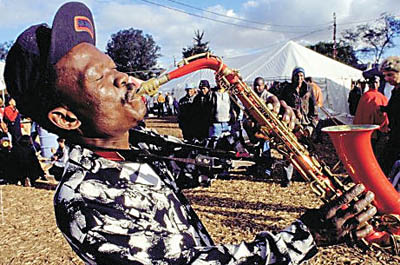IASPM 2011 16th Biennial International Conference
Grahamstown South Africa
27 June/1 July 2011
For its 16th biennial conference, the International Association for the Study of Popular Music (IASPM) invites papers which explore the many ways of situating popular music in the light of IASPM celebrating its 30th year.
The opening plenary will be given by Philip Tagg, IASPM founder.

The week of the conference leads up to the Grahamstown National Arts Festival which is the biggest art festival in Africa and the southern hemisphere. This will be a stimulating context for members of IASPM to explore arguments about different popular music practices, spaces and places.
Papers will be organized around the following streams:
IASPM 30 Years On
Convenors: Jan Fairley, Helmi Järviluoma
When IASPM began back circa 1981, it pulled together a passionate, fragmented group of people working at the fringe or outside the academy in many different parts of the world, their work often looked down on by mainstream musicologists and many music departments. Thirty years later Popular Music is very much part of the academy (music, musicology, cultural studies, sociology, history, media, women’s studies departments etc), with an increasing number of large, research projects, publications, journals and students. It’s inter-disciplinarity has seen it draw on many theoretical positions and have impact in many areas. What kind of benefits have come with the institutionalisation of Popular Music? What has been achieved and where are we heading? Have gender and disciplinary boundaries been breached positively or only notionally? Has there been mutual influence between disciplines? Why have popular music studies achieved a higher profile and gained more ground in some countries rather than others? Does Anglo-US work still dominate eclipsing revealing work from other cultural sources and if so why? How does IASPM interface with professionals working outside the academy? Have popular music studies had any impact on popular culture and on society as a whole?
Multisited Popular Music
Convenors: Michael Drewett, Violeta Mayer
How have the development of theories and methodologies for multisited and transcultural approaches to popular music impacted on research? This is IASPM’s 2nd conference in Africa, the first being Ghana 1987 (Africa in the World of Popular Music) an event which produced lively debates which some feel got lost in subsequent years. With the conference in South Africa comes an opportunity to map post colonial music scenes in the world on all continents. It offers an opportunity to explore what is meant by African music; to critique historical binaries; to consider the intricacies of ‘diaspora’; to discuss the impact of Africa in the world, and the way different African musics which are seen to underpin so many musics in the world, regionally and generically, have interacted with and absorbed ‘other’ musics.
Popular Music and the Culturalization of the Economy
Convenors: Héctor Fouce, Helmi Järviluoma
In many parts of the world music is now an integral part of the ‘culturalization of the economy’ with an increasing emphasis placed on culture as part of local/ national/ international governing bodies, as part of city regional and national economic re-generation, an integral part of city festivals, music festivals and modern tourism. The opposite may be true in countries which have strong, even burgeoning manufacturing economies. What are the implications of these shifts for popular music and for popular music studies?
Popular Music Challenges
Convenors: Carlo Nardi, Héctor Fouce
How can a musician earn a living in the age of digital music? How and why has the live scene reconfigured from stadium rock to living room concerts? In what ways do pirate sites, legal downloads and streaming system coexist? Who owns what in terms of authorship and technology? What kind of struggles are going on? How has swiftly changing technology and media affected creativity and performance practices in music and dance?
The Power and Politics of Sound and Body
Convenors, Jan Fairley, Violeta Mayer
Has it ever been valid to talk about ‘music’ per se and is it valid anymore? How is musical creativity and composition responding to the increasing demands and complexity of the technological world and its so-called democratization’? What kind of musical analysis lends itself to examining popular music texts created for different musical contexts today? How ethnocentric and class-centric are musical metadiscourses? How is music and dance being approached? Are old arguments concerning emotion and meaning valid anymore? What methods are being used to explore the relationship between music and religion; the ‘spiritual’; well-being; health; political beliefs, and many kinds of human struggle?
The conference address is iaspm11@gmail.com
The programme will be published online as soon as possible in 2011.
We look forward to seeing you at this very special conference in South Africa in the 30th year of IASPM!
The IASPM-International Executive
